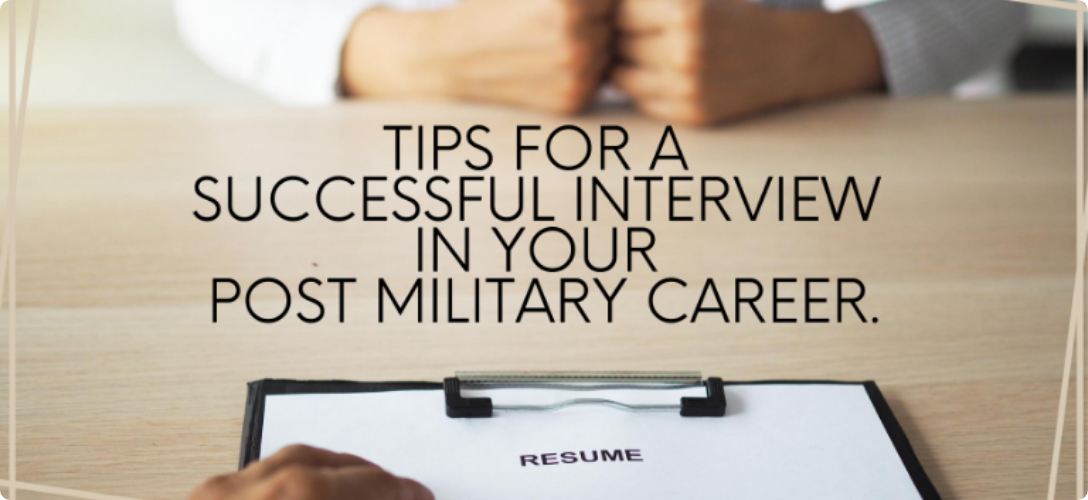contributed by Liz Zaczek, senior staff writer

How do you take all the skills learned in the military and apply them to a new career and livelihood outside of the military?
Transitioning from life and career in the military to the civilian sector can be challenging for veterans, and just like many seeking employment, many are concerned about proper interviewing techniques.
Here are some tips and advice to help veterans put their best foot forward in an interview for their new civilian career.
1.Prepare a resume detailing your skills and experience in the military. Do your best to avoid military jargon by using a skills translator or military occupational classification (MOC) tool to help you put those terms into words that civilian employers will understand.
2. Contact and update your references. If you’ve not been in regular or recent contact with them, reach out and touch base with them so they know to possibly expect communication from your potential employer.
3. Research and review information about both the job you are applying for and the company itself including who will be conducting your interview. Learn all you can about the company, not only from their corporate website, but also from their social media accounts. Learn about the history of the company or organization, their board of directors, department heads, product lines and other pertinent information. Having this knowledge will help you be prepared for any questions you are asked along with the style of interview you may have.
4. Plan to dress professionally, albeit in civilian attire, for your interview. In today’s civilian workplace many companies and organizations have a more casual dress code than even just a few years ago, however, it is always better to be just a little “overdressed” than under. Researching the company’s dress code should provide information to guide attire choices for the interview.
5. Print and bring several copies of your resume with you in a portfolio or binder. They may not be needed but it is better to be prepared to distribute them to additional people participating in the interview.
6. Plan to arrive between 10 and 15 minutes before the scheduled interview time. This shows the prospective employer that you value their time and understand accountability. If an unavoidable and unexpected delay happens, be sure to call your interviewer promptly to let them know.
7. Greet each person you interact with throughout the meeting(s). Be confident and positive about your skills and abilities to be an effective employee and positive member of their corporate environment.
8. Remember to, as best as possible, avoid the use of military jargon in your answers to interview questions. Answer questions using the STAR (Situation, Task, Action, Result) format and be sure to properly explain how your military experience is related to the position.
9. Describe situations in the military in which you successfully achieved your end goal. Employers often ask potential employees to tell a story about past job experience to assess how candidates will conduct themselves in new positions. Being able to complete a task from start to finish with discipline and preparedness is a key trait of people in the military, and one that all employers will appreciate. Narrate one or two brief examples of how you put your skills into practice and how this kind of quick thinking will translate into your civilian job.
10. Reach out to the interviewer or employer after the discussed follow up date (if it was provided).
11. Send a thank you email or (if appropriate) drop off or mail a letter of appreciation.Restate your interest in the job position and thank the interviewer or corporation for their time. You can also include any details you may have forgotten to discuss during your interview.
12. If you received a job offer, assess if the work is the right fit for you. Be sure to consider, among other things: the job environment, location, salary and benefits and company culture.
13. If you do not hear back from the employer or are not chosen for the position, do not get discouraged. Understand that there are many reasons that you may have not been offered the job. It may have not been because you did not pass or make a good impression during the interview. Do a self-assessment of what went right and wrong and refine your interviewing techniques.
14. Keep up the effort and be sure to follow the aforementioned tips, you will find the right employer and position if you persist and remain resilient!
15. Need a great starting place and resource for all things job search related? Check out the Jobs Portal on Military Connection. There you will find options to browse current job listings, a chance to upload your resume and even put our skills translator to use as you transition into your dream civilian career and so much more.
© 2006-2020 Military Connection, Owned by BL, LLC. All rights reserved

 Getting to Know the Coast Guard on Their 230th Birthday
Scroll to top
Getting to Know the Coast Guard on Their 230th Birthday
Scroll to top